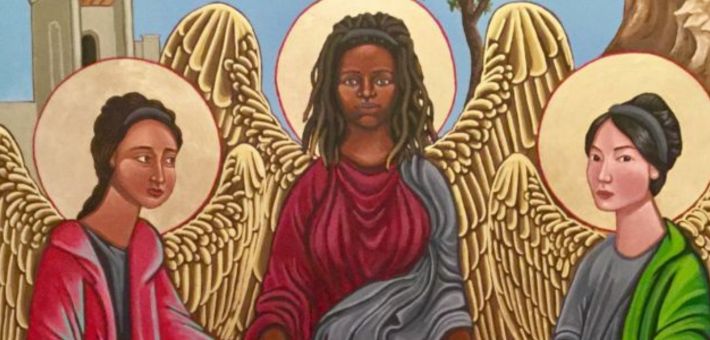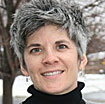Commentary on Psalm 8
“Who am I?” is one of those questions I’ve asked of God on numerous occasions.1
“Who am I, God, compared to all this beauty that you have made?” This was my question some years ago while driving through the Canadian Rockies … alone … in a blizzard … in a white car … with no cell phone reception. (I’ll spare you the “up hills both ways” line.) Who am I compared to all of this majesty and wonder? I knew I could get swallowed up by the strength and power of all that surrounded me. My cry was one of desperation as well as awe. What are human beings that you are mindful of them? The response was loud and clear: “Yet you have made them a little lower than God, and crowned them with glory and honor.”
Moving from feeling so insignificant to recognizing one’s significance even in the face of such grandeur was very powerful. The mystery of it all invited me to affirm this God as my God all the more. What a faithful objective for a Trinity Sunday sermon! That is, to move the hearers to proclaim God as their God.
The Psalmist’s question that became my question (and, indeed is our question) is not only existential, but profoundly theological, and therefore fitting for Trinity Sunday.2 So, preachers, before getting to the proclamations of the scripture readings from 2 Corinthians and Matthew, considering lingering in the mystery expressed in Proverbs 8 and especially Psalm 8. Linger for a while in the question, who are we? I, for one, would welcome a sermon on Trinity Sunday that doesn’t sound like a cropped confirmation lesson that explains away the Father, the Son, and the Holy Spirit. Instead of boiling it all down, open it all up! That is, open my world to the awesome mysterious claim that our God, the creator of the majesty that surrounds us, gives us the awesome responsibility of caring for such majesty.
As usual the structure of the Psalm itself can assist preachers with the sermon form. Consider a sermon which progresses in a chiastic form just as the psalm does.
A – Doxology
B – God’s work
C – Who am I?
B1 – God’s work
A1 – Doxology
A and A1: Doxology
I can think of no better way to begin (and end!) this sermon than with a doxological claim that God’s name is majestic in all the earth. How is God’s majesty evident in your congregation’s life? Is there a phrase that your congregation has used to reflect this? What difference does it make that this majestic one is not just any Lord, but our Lord? The relationship indicated in these opening and closing words is key: “O Lord” itself suggests a relationship, but then there is the added, “our Lord.” The repetition and emphasis are worth … well, repeating and emphasizing!
B and B1– God’s work
Psalm 8 is the first Psalm categorized as “hymn of praise” in the Psalter. It is unusual in that it consists completely of direct address to God (other hymns of praise include a call to praise which is directed from the Psalmist to the people3). These leads me to wonder if a sermon could be offered with a similar direction of address. One possibility might be to invite congregation members to submit images of God’s handiwork in their midst. Have these images rolling throughout the sermon as a kind of collective offering of affirmation and praise.
C and C1 – Who am I?
God’s heavens, the work of God’s fingers, the moon and the stars, for example, prompt the Psalmist’s (and our) question: Who are we that you are mindful of and care for us? Or, as the Hebrew suggests, who are we that you remember and visit us? Even more, who are we that you would give us a job? trust us with such a responsibility? Mays reminds us that “human beings have an office in the world … the generic human being is an official in the administrative arrangement of the kingdom of God.”4 In Levenson’s words, “The human race is YHWH’s plenipotentiary, his stand in.”5 (Since plenipotentiary is not a word I would suggest using from the pulpit, I’ve been playing with the word understudy.)
Just when the spotlight for this Trinity Sunday sermon seems to be undeservedly on us, we are reminded that even the reflective segment of this Psalm (section C in verses 3-4) “is voiced in the idiom of worship.”6 The very human question “Who are we?” is ultimately asked to praise the Lord.7
If I were to draw this Psalm, I would place section C and its question “Who are human beings … ?” in a center circle. I would encircle that inner circle with another and include in that layer sections B and B1. The outermost layer would then contain sections A and A1. The result would be a kind of sermonic rebus, which would suggest that our very human questions are lovingly surrounded by God’s magnificent handiwork and our commitment to care for it. All of this is then enveloped by the proclamation of trust in the majesty of God’s name. This is what got me through that drive in the Canadian Rockies, and it will carry us through as we stand at the precipice of another long season of Pentecost.
Notes
- Commentary first published on this site on May 22, 2016.
- Jacobson, Rolf A. “Psalm 8.” In Psalms for Preaching and Worship: A Lectionary Commentary, edited by Roger E. Van Harn and Brent A. Strawn, 64-67. Grand Rapids: Eerdmans, 2009.
- Mays, James L. “Psalms.” Louisville: John Knox Press, 1994, 65.
- Ibid., 66.
- Levenson, Jon D. Creation and the Persistence of Evil. San Francisco: Harper & Row, 1988, 114.
- Mays, James L. “Psalms.” Louisville: John Knox Press, 1994, 66.
- Ibid., 68.


June 4, 2023